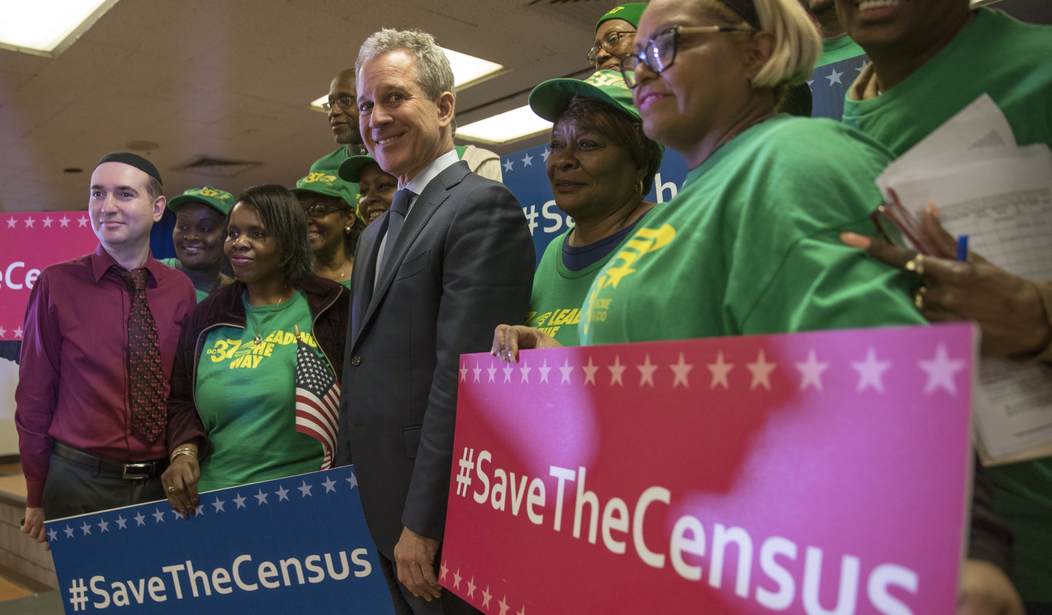Every ten years, the U.S. government undertakes a census or count of everyone living in the United States. The Constitution mandates this in Article 1, Section 2, and established the first census would take place in 1790 and every ten years thereafter. The census language is straightforward and explicitly ties the census to representation in the republic government. The 14th Amendment, ratified in 1868, modified the census language and the definition of citizenship to include everyone born within the United States regardless of origin, making freed slaves citizens for the first time. The 14th also made children born within the national borders citizens, whether their parents were citizens or present in the country legally or not. The latter is likely an unintended consequence, as post-Civil War America was preoccupied with Reconstruction and, for the Republicans, bringing the slaves the party was founded to free toward the rights of citizenship.
Both the original language in Article 1, Section 2 and the 14th Amendment tie the census directly to representation in the U.S. House of Representatives. This is important to understanding the purpose of asking about citizenship on the census.
Inquiring about citizenship on the census goes back to at least 1800 and Thomas Jefferson. The founder, author of the Declaration of Independence and president-to-be wanted the census to ask about the “respective numbers of native citizens, citizens of foreign birth, and of aliens…for the purpose of more exactly distinguishing the increase of population by birth and immigration.” In 1820 the census began asking the questions President Jefferson wanted answered.
Citizenship was deeply important to the founders. Their revolution was about replacing the concept of the subject of the crown with that of the self-ruling citizen. As John S. Baker of Our Citizenship Counts recently wrote in The Hill:
The United States was the first nation since the ancient Greek and Roman republics to establish citizenship. American colonists were “subjects” of the British Crown. Even in the ancient republics and pre-Civil War United States, citizenship was limited. Other inhabitants — whether slave or free — did not participate in governing.
Citizenship has been routinely asked in the census in one way or another. Up to the 1950 census, citizenship was asked either directly or as a follow up of all respondents. Citizenship was removed from the short questionnaire in 1960 but was included on the longer questionnaire that went to a subset of census respondents starting in 1970 – until 2010. President Obama dropped the long form altogether in 2010, thereby dropping the citizenship question.
The Trump administration wants the census to resume asking every household in the country about citizenship. The administration’s question does not ask about legal residence. Federal law forbids agencies from using census data for immigration law enforcement. The Trump administration’s proposed question asks, “Is this person a citizen of the United States?” That’s it. It’s a question that puts Trump squarely in Thomas Jefferson’s corner and in the mainstream of American history. In fact, the Census Bureau’s American Community Survey, a continuous look at the U.S. population, always asks about citizenship.
So why is a nation asking about citizenship on its census, for the purposes of both representation in government and taxation as the Constitution mandates, even controversial? Democrats say that it could lead to undercounting some minority populations. That’s speculative. After Obama dropped the long questionnaire in 2010, minority counts did not change one way or the other.
But the real purpose of failing to ask about citizenship may be to undercount and under-represent citizens and give states that attract more non-citizens more House representation than they are due. Failing to ask about citizenship may also make enforcement of voter fraud more difficult, by making counts less accurate.
Currently, each of the 435 seats in the U.S. House represents about 750,000 people. California has the most seats, at 53. Texas comes second with 36. New York and Florida follow with 27 each. Alaska, Delaware, Montana, North and South Dakota, Vermont and Wyoming are at the other end of representation and all only get one seat in the House.
According to the Pew Research Center’s latest numbers, California’s illegal immigrant population stands at around 2.2 million. That’s more than the entire population of the states that only have one House seat. Wyoming, for instance, has fewer than 600,000 residents.
California famously grants extreme taxpayer-funded benefits to illegal immigrants. Gov. Gavin Newsom just signed a law allowing free healthcare for illegal immigrants, for instance. This benefit, which even legal California citizens do not get, will logically attract more illegal immigrants to California. While those illegal immigrants cannot (yet?) vote in elections, they will be represented in Congress in the number of House seats California gets. Instead of 50 seats, California gets 53. With House seats capped at 435, those seats have to come from other states. It’s a zero-sum game.
California’s high illegal immigrant population translates directly into three House seats. California can negate smaller states’ House representation by granting more largess to non-citizens. Other blue states can follow California’s lead, growing their own House representation through attracting illegal immigration and squeezing swing states like Ohio and Pennsylvania, which tend to be in the middle range of House seat allocations.
The census is at the heart of representation in our republic. The Constitution explicitly connects the census to representation of citizens. Citizenship has been a routine part of the census for most of our national existence, and resuming capturing this data ought not be controversial. Objections to the citizenship question are speculative at best, disingenuous at worst. The citizenship question is only controversial because like nearly everything else in American life, some want to use the census to serve their own political power plays.









Join the conversation as a VIP Member